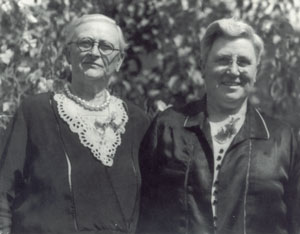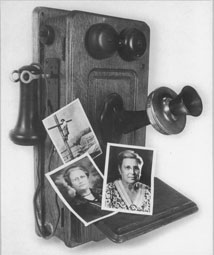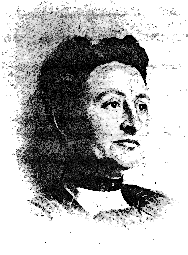
Katherine Glover was the first person I laid eyes on at 2am, April 23 1908 as she assisted my mother at my birth in Baker City- later known as Concrete, WA. She told me many times that I was the only blabby she had ever had and that she had one Devil of a time getting old Dr. Kellner away from the pool hall, where he was playing cards, so he could deliver me. (These are her exact words quoted here.)
Baker City at the time of my birth was a rough Western Town. With many prospectors, shingle weavers, and loggers (some just passing through), and the Cement Business were attracting many from foreign shores. The pack trains were kept busy packing supplies in and out of the places inaccessible to nay travel except by River or Horse or Mule Train. I am told there were thirteen Solons in Baker City, and each had rooms to rent above.
I have never known why Kate Glover came to Baker City from the East Coast. She was married to Joe Glover and living on a homestead with her husband when my folks first met her. She told how she helped Joe Glover prove up on their timber claim, which was located on the upper Baker River, near Bear Creek. Her claim was next to another pioneer named Paul Harmon. Paul told me that Kate was a beautiful woman when he first met her. He also told how she worked splitting shingle bolts along with her husband during those hard times just so they could keep enough food and live there long enough to prove their claim. He said Joe Glover was a crude western uneducated person that often took the money from the shingle bolt sale and drank until it was all gone. Kate would then have to borrow form her friends to put food on their table. Mr. Harmon and other told how often Kate wore black eyes from her husband's abuse. I personally only encountered Mr. Glover a few times in my life; Kate was divorced from him by the time I was old enough to be around her much.
Kate Glover was hired by Superior Portland Cement Company to manage their Telephone Exchange about 1908. She lived at the exchange and did all the work involved until the phone company became incorporated. She invested her wages and thru the years was able to purchase the controlling interest. She bought the building and with the Telephone System on the lower level she converted the upper store to rented rooms with an outside stairway. The big sign on the outside of the building read "Rooms To Rent 50 Cents A Night".
Mrs. Glover purchased a large two-story house that set across a large vacant lot from the main telephone office where both she and sister Nell lived. In 1922 I was given consent by my parents to spend the summer vacation doing small jobs for the two ladies. I lived in their house, along with Glovers 23 cats (some of which were kept out side). It was my duty to do some of the cooking and cleaning. I was expected to work at the office sorting accounts and do some book work. It was a good training period for me, the two sisters were thoughtful and kind to me, but when they ask for a job to be done they expected me to follow orders. They both had big appetites and liked sour dough hot cakes for breakfast. One morning as they both sat at the table while I cooked their hot cakes Nell said, "Kid, these hot cakes don't taste right" and Glover said, "What did you put into them?" I said "nothing!" You should have heard them roar with laughter- they had a great sense of humor. I learned later that I was supposed to put some flour and water into the starter of their dough to keep it working. They always called me the Kid, and believer me I heard the story of the hot cakes from them many times as the years passed.
Those two sisters were the most enterprising and energetic persons I have ever known. They could not leave the vacant lot empty between the telephone office and their home, so they built long building and raised thousands of chickens, sold eggs and fresh chickens. I felt some surprise that the city would allow such a smelly operation in its center. But I never failed to be amazed at the number of jobs they could be handling at the same time in their lives. Nell could continue to manage all of the line crew, clean and run the chicken business, and still find the time to play for dances and come in at 4 a.m. and hit another day of work without hesitation. They always seemed to have a number of businesses going at the same time. I felt they sometimes made an endurance test of their lives. They made long vacation trips and would sometimes boast about how far they could drive in one day. (Glover did not drive; Nell did all of the driving. Glover always said that Nell was the best driver of a car she had ever known because she never missed a bump in the hiway.)
When they bought the big Tugboat so they could tow logs to the Mill on Lake Shannon they also had the franchise for fishing boats. They built a big float, had about fifty boats for rent, so while Nell ran the tugboat, Glover ran the fish boat operation from the float. (Most of the fishermen came on weekends or holidays, so she was able to keep the telephone business going at the same time.)
Both women took an active interest in civic affairs. They organized the Royal Neighbors in both Hamilton and Concrete of which they of course were Charter Members- the Royal Neighbors are still active in Concrete.
As I look back on the lives of Nell Wheelock and her sister Kate Glover I still marvel at their abilities and insatiable desire to manage so many jobs at a time. They remind me of a well-trained juggler. And the remarkable part of it is they got away with it until Glover became too ill to keep tract of their operations. Nell did the heavy work, but Glover was always the instigator. Their great fault (I am sorry to find any fault with either of them) was putting too much trust in some of their employees whom they expected to have the same honor and high standards as their own.
Example: Their trusted bookkeeper was a lady with a beautiful face and as it turns out a very devious mind. She had been part of the operation in the Telephone for a number of years. Glover's health started failing in the early 1930's, which required several surgeries, her expense was great. I am not sure just when she found it necessary to give the bookkeeper a power of attorney, however she trusted her enough to let her make payroll and sign the checks. As a consequence the person stole the greater part of the company bank account, and broke the Skagit River Telephone Company. (I shall not name the person as she still has living children).
The bookkeeper was sent to prison for her deeds and the telephone company was sold to pay the debts to the Judy's at Mt. Vernon and became The Skagit Valley Telephone Co. [July 4, 1935]
Glover and Nell then moved to some unimproved land near Birdsview, put up chicken houses and a small house and barn. Hard luck followed them, their chicken houses burned from an overheated wire, and with no insurance and with Glover in very poor health their debts increased. When Glover died she was deeply in debt. So Nell bought an old tractor and worked wherever she could find work and paid off every cent either of them owed before she too passed.
They were two of the finest people; it has been my privilege to know. They were very successful at most all of their endeavors at a time when women were not expected to succeed- in fact many men in that area opposed their every effort- some areas of their lives was a rough obstacle course. Perhaps they were the first of the ERA in the Skagit Valley. At any rate they earned my admiration, and loving personal regard.
Gladys Pape Miller

Nellie Quackenbush Wheelock relates, "When I came to Washington State I weighed but ninety-eight pounds. I was so weakened by diseased lungs that I barely lived the trip thru the high Rockies".
Nellie Quackenbush, a registered nurse could not practice her trade in her home state because of her health, thus she had two reasons for coming to Washington- her health and because her sister Kate lived in the Skagit Valley (I believe the year was 1910 or 1911).
As her health improved she became interested in learning about wiring and the telephone system in general. Eventually riding a horse along the areas where wires were connected to trees and sometimes poles. My first recollection of her was about 1916 when she stopped at our house to dry off and get a meal. We lived near Birdsview, on the old River Road. Nell road along the County road between Concrete and Hamilton looking for limbs over wires. It took a sharp eye and hard work after a windstorm to keep the telephone in service.
She was married at that time to a Frenchman named Jack Wheelock, a quiet, neatly dressed man. I remember he always wore a goatee beard. Her husband owned and operated the Commercial Hotel near Old Hamilton Depot.
By the time Nell was married the first telephone office had been established in Hamilton, a small office near the Hamilton Drug Store on Main Street. Nell was responsible for this operation under the supervision of her sister Kate. The first operators she hired were as followed: Jessie Stafford Glidden, Hazel Shannon Morris, and Hazel Pape O'Hara (the last person is my sister, she is the only one living at the age of 88, near Hamilton).
The Telephone Company was fast becoming larger. With the lines extended to Hamilton and connected to the National system thru the Sedro-Woolley office soon the service became necessary for all the local businesses to be involved. The big Logging Camps, and all the Government Operations such as the Ranger Stations and Fish Hatcheries on both ends of the Valley put in their wires and kept them serviced to the main connections. I can remember how the loud bells form the Marblemount Ranger Station, operated by Tommie Thompson, would ring into the old Concrete Office. They had to yell every word to be heard and the operators would need to yell back.
Nell was in charge of the work crew that dug and set all the company poles. She had a team of horses she drove to drag the poles into position, with the aid of some hired help she directed the pole setting, and then did the wiring.
She acquired an Overland Touring Car about 1917 or 1918 and became equally able to repair the mechanic and change tires. (The dirt roads were rough and full of holes; consequently tires did not last long). I know about these assertions first hand, as I rode with her many times over a period of years. Our families were close associates.
A large new building replaced the old telephone office at Hamilton. It was a huge two-store building wit the foundation about eight feet high form the ground level to prevent the flooding of the main building during high water from the Skagit River. Nell was separated from Mr. Wheelock by the time the new office was finished; the new establishment became her permanent home. It seemed to me because of the great kindness of her heart and perhaps her need to be needed by someone weaker, she took a young motherless fifteen year old cripple girl under her protection, gave her a place to live in the only downstairs room at the Hamilton Telephone Office, taught her to work the switchboard, which gave the girl a useful life. This girl had been crippled from birth and needed to walk all of her life with the aid of crutches- she became an excellent operator, a happier person. She was a favorite to those she served.
Another example; next door to the Hamilton Office lived another girl that needed a place to live- her family had too many children to keep in their small house- however another child seemed to be born each following year. It was a situation where there was too little food to go around and not enough space. Nell took this girl under her wing, let her work for her board and room plus a small pay, and eventually she was taught to work the switchboard, and it became her life work. Her mother continued to have children and Ethel was close enough to help out with the work at home when her mother was confined, however her training at the telephone office was a great blessing, she was never able to finish her education beyond the 8th grade.
Nell helped to give these girls and many more a fuller more decent life. They were invited to travel on vacation with Nell and her sister Kate. Often some of them attended the dances where Nell and Glover and their small orchestra played. Their Orchestra was popular throughout the valley. Glover played the violin and the drums- Nell played the violin and saxophone and most other horns. Both sisters had fine musical training before leaving New York.
Nell set up a music room in the Hamilton Telephone Office and arranged for a music teacher by the name of Mrs. Davies to teach all the interested children in our area on the upright piano Nellie had purchased with her own money. The children in our family took lessons there once a week for many years, as did many others.
Nellie Quackenbush had high standards, which she insisted the young abide. Personally I found her to be strict, sometimes stern, but always fair, kind, and wonderfully warm when comfort was needed. (She practiced her nurses training on some of us, thankfully, when we had a bad cold she would apply a cold mustard plaster- believe me after that a person would try to get well in a hurry).
When her marriage failed with Mr. Wheelock there was no more romance in her life until about 1920. She fell in love with a young Irishman- this man worked closely to Nell as the Company's top lineman. However he married the company bookkeeper. [ George O'Hara wed Hazel Pape].
As I sit here thinking back over the many years I was privileged to know
(Sometimes live with them for months at a time simply because I was fond of both of those wonderfully interesting women). How totally inadequate I feel to write of the value of their lives. They enriched the lives of many, both family and friends. Their whole lives were a benefit to all that were connected with them. They were beloved and respected by those that knew them well. I knew them as well, and much longer than my parents; I considered them pillars in my life. On special days during their lifetime all gifts and cards from them were always signed as Aunt Nell or Aunt Kate and I am sure many of the girls that worked for them received the same amount of thoughtful kindness. It is my desire to present the lovely human side of these two fine ladies. They were loyal to each other, and their word was as good as a contract to their friends and associates.
The Telephone Office in Hamilton was closed in 1930; all business was then transferred to the Concrete Office. Nell had moved her headquarters to concrete previously.
Gladys Paper Miller Oct. 20, 1982
|



 She was born Kate Quackenbush in New York State about 1885. She came to the Northwest Coast on horseback, it was said.
Somewhere along the line she met and married Joe Glover. He was part Cherokee; tall, gaunt, old western law man. Kate saw him as a romantic person who could always give her a good argument.
She was born Kate Quackenbush in New York State about 1885. She came to the Northwest Coast on horseback, it was said.
Somewhere along the line she met and married Joe Glover. He was part Cherokee; tall, gaunt, old western law man. Kate saw him as a romantic person who could always give her a good argument.
